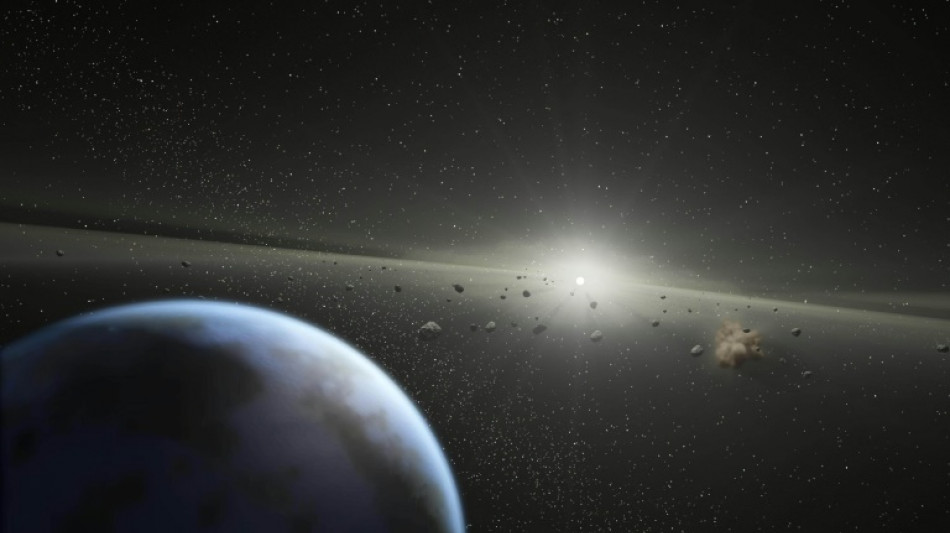
-
 Japa's Miura and Kihara capture Skate America pairs gold
Japa's Miura and Kihara capture Skate America pairs gold
-
Who can qualify for 2026 World Cup in final round of European qualifiers

-
 UK to cut protections for refugees under asylum 'overhaul'
UK to cut protections for refugees under asylum 'overhaul'
-
England's Tuchel plays down records before final World Cup qualifier

-
 Depoortere double helps France hold off spirited Fiji
Depoortere double helps France hold off spirited Fiji
-
Scotland face World Cup shootout against Denmark after Greece defeat

-
 Hansen hat-trick inspires Irish to record win over Australia
Hansen hat-trick inspires Irish to record win over Australia
-
Alcaraz secures ATP Finals showdown with 'favourite' Sinner

-
 UK to cut protections for refugees under asylum 'overhaul': govt
UK to cut protections for refugees under asylum 'overhaul': govt
-
Spain, Switzerland on World Cup brink as Belgium also made to wait

-
 Sweden's Grant leads by one at LPGA Annika tournament
Sweden's Grant leads by one at LPGA Annika tournament
-
Scotland cling to hopes of automatic World Cup qualification despite Greece defeat

-
 Alcaraz secures ATP Finals showdown with great rival Sinner
Alcaraz secures ATP Finals showdown with great rival Sinner
-
England captain Itoje savours 'special' New Zealand win

-
 Wales's Evans denies Japan historic win with last-gasp penalty
Wales's Evans denies Japan historic win with last-gasp penalty
-
Zelensky renews calls for more air defence after deadly strike on Kyiv

-
 NBA's struggling Pelicans sack coach Willie Green
NBA's struggling Pelicans sack coach Willie Green
-
Petain tribute comments raise 'revisionist' storm in France

-
 Spain on World Cup brink as Belgium also made to wait
Spain on World Cup brink as Belgium also made to wait
-
Spain virtually seal World Cup qualification in Georgia romp

-
 M23, DR Congo sign new peace roadmap in Doha
M23, DR Congo sign new peace roadmap in Doha
-
Estevao, Casemiro on target for Brazil in Senegal win

-
 Ford steers England to rare win over New Zealand
Ford steers England to rare win over New Zealand
-
Massive march in Brazil marks first big UN climate protest in years

-
 Spain rescues hundreds of exotic animals from unlicensed shelter
Spain rescues hundreds of exotic animals from unlicensed shelter
-
Huge fire sparked by explosions near Argentine capital 'contained'

-
 South Africa defy early red card to beat battling Italy
South Africa defy early red card to beat battling Italy
-
Sinner beats De Minaur to reach ATP Finals title match

-
 Zelensky vows overhaul of Ukraine's scandal-hit energy firms
Zelensky vows overhaul of Ukraine's scandal-hit energy firms
-
South Africa defy early red card to beat Italy

-
 Alex Marquez claims Valencia MotoGP sprint victory
Alex Marquez claims Valencia MotoGP sprint victory
-
McIlroy shares lead with Race to Dubai title in sight

-
 Climate protesters rally in Brazil at COP30 halfway mark
Climate protesters rally in Brazil at COP30 halfway mark
-
Spike Lee gifts pope Knicks jersey as pontiff meets film stars

-
 BBC caught in crossfire of polarised political and media landscape
BBC caught in crossfire of polarised political and media landscape
-
'Happy' Shiffrin dominates in Levi slalom for 102nd World Cup win

-
 Palestinian national team on 'mission' for peace in Spain visit
Palestinian national team on 'mission' for peace in Spain visit
-
Brazilian 'Superman' cheers child cancer patients in Ghana

-
 India close in on win over South Africa after Jadeja heroics
India close in on win over South Africa after Jadeja heroics
-
Huge explosions rock industrial area near Argentina's capital

-
 Bezzecchi takes pole for Valencia sprint and MotoGP
Bezzecchi takes pole for Valencia sprint and MotoGP
-
Dominant Shiffrin leads after first slalom run in Levi

-
 Nine killed in accidental explosion at Indian Kashmir police station
Nine killed in accidental explosion at Indian Kashmir police station
-
Climate protesters to rally at COP30's halfway mark

-
 Fighting South Africa lose Rickelton after India 189 all out
Fighting South Africa lose Rickelton after India 189 all out
-
Harmer leads South Africa fightback as India 189 all out

-
 Prison looms for Brazil's Bolsonaro after court rejects his appeal
Prison looms for Brazil's Bolsonaro after court rejects his appeal
-
EU bows to pressure on loosening AI, privacy rules

-
 India close in on lead despite South African strikes
India close in on lead despite South African strikes
-
Curry's 49 points propel Warriors in 109-108 win over Spurs


Where are all the aliens?: Fermi's Paradox explained
Astronomers raised hopes that humanity might not be alone in the universe by announcing on Thursday they have detected the most promising hints yet of life on a distant planet.
But given the age and vastness of the universe, a different question has long puzzled some scientists: why haven't we already come in contact with aliens?
"Where is everybody?" Enrico Fermi asked fellow famous physicists including Edward Teller over lunch in 1950.
This quandary was named Fermi's Paradox.
"It's a numbers game," Jason Wright, the director of the extraterrestrial intelligence centre at Pennsylvania State University, told AFP.
The Milky Way is around 10 billion years old and is home to more than 100 billion stars.
This suggests there is likely a mind-boggling number of potentially habitable planets in our home galaxy alone.
That could include K2-18b, where astronomers said Thursday they have detected signs of a chemical that is only produced by microbial life on Earth.
Wright said Fermi's Paradox essentially suggests that -- given enough time -- "every alien species will eventually have their own Elon Musk who will go out and settle the next star over".
That we have not yet heard from aliens is known as "the mystery of the great silence".
- So what are the theories? -
At least 75 speculative solutions to Fermi's Paradox have been proposed so far, according to a 2015 book, though Wright guessed more have been added since.
First, it is possible that humanity has not yet detected alien life because there isn't any -- we are truly alone.
Many scientists feel this is unlikely.
Some 87 percent of over 1,000 scientists in relevant fields surveyed in Nature Astronomy earlier this year agreed there is at least a basic form of extraterrestrial life.
More than 67 percent agreed that intelligent aliens are out there.
Of course, it is also possible that aliens are already here and we have not noticed -- or that it has been covered up.
Or interstellar space could just be too difficult to traverse, the distances too vast, the resources needed too great.
- What if there is a 'great filter'? -
Another theory is that there is some kind of "great filter" that prevents life -- or intelligent life -- from occurring in the first place.
Or perhaps there is some kind of barrier that stops civilisations from advancing beyond a certain point.
For example, once civilisations develop the technology to travel through space, they might tend to destroy themselves with something like nuclear weapons.
Or maybe they burn through their planet's natural resources, or make their climate unliveable.
Some of these theories seem to be influenced by fears for human civilisation -- the one example we have of intelligent life.
But Wright felt this was unlikely because any such barrier would have to be the same across the whole universe.
It would also have to make the species go totally extinct every time, otherwise they would eventually bounce back and try again at space travel.
- Are we in a zoo or planetarium? -
There are even more galaxy-brained ideas.
Under the "zoo" hypothesis, technologically advanced aliens would be leaving humans alone to observe us from afar, like animals in a zoo.
The "planetarium" hypothesis posits that aliens could be creating an illusion that makes space seem empty to us, keeping us in the dark.
- ...or a 'dark forest'? -
This theory got its name from the second book in Chinese author Cixin Liu's science-fiction series "The Three-Body Problem".
It posits that the universe is a "dark forest" in which no one wants to reveal their presence lest they be destroyed by others.
There are other hypotheses that aliens prefer to "transcend" to another plane of existence -- which some have compared to virtual reality -- so don't bother with interstellar travel.
- Why would they all be the same? -
But there is a big problem with many of these "so-called solutions," Wright said.
They tend to assume that all the hypothetical kinds of aliens across the universe would all behave in the same way -- forever.
This has been dubbed the "monocultural fallacy".
Wright, who has used SETI telescopes to search for radio signals or lasers from the stars, also pushed back against the idea that humanity would necessarily have already picked up on any alien signal.
Aliens could be sending out messages using all sorts of unknown technology, so maybe the galaxy is not as silent as we think, he said.
"Those of us looking for life in the universe generally don't think of the Fermi paradox or the great silence as such a big problem."
O.Mousa--SF-PST




